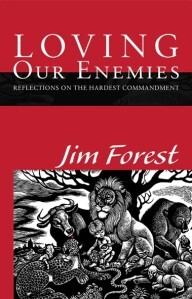Reading: “Loving Our Enemies” by Jim Forest
 Loving our Enemies:
Loving our Enemies:
Reflections on the Hardest Commandment
by Jim Forest
My rating: 5 out of 5 stars
I first came across the late Catholic peace activist Jim Forest when I read his book The Root of War is Fear: Thomas Merton’s Advice to Peacemakers a few years ago. And as will happen, after I bought that one, more of the author’s books were suggested by the ever-present algorithm. This one caught my eye. Forest has worked with groups like the International Fellowship of Reconciliation and Dorothy Day’s Catholic Worker. This book, one among several he has written, focuses on what really might be Jesus’s “hardest commandment”— to release ourselves from feeling “enmity” toward people who have wronged us or angered us, toward people whose actions or ideals we oppose, toward anyone we regard as an enemy by choosing to love them instead. It wouldn’t be hard at all to take a dogmatic or preachy approach to such a topic, yet Forest does it with humanity and with historical and textual evidence, while acknowledging that actually doing what he describes is never easy and is often not acceptable to others.
Loving our Enemies is organized into the three sections: “Thistles and Figs,” “Nine Disciplines of Active Love,” and an “Epilogue.” The first section sets the groundwork by rooting a desire for peace in the Bible, Catholic thought, and real life. The opening chapter provides block quotes of those passages in the Gospels of Matthew and Luke, when Jesus gives his admonition to “do good to those who hate you.” Subsequent chapters offer a philosophical basis, then Forest describes what he calls “the Gospel of John Wayne.” This perspective says that justice comes when the good guys go out and find the bad guys and beat ’em down! Forest’s counterargument, which is accompanied by examples as proof, reminds us that the John Wayne perspective doesn’t lead to long-term peace and doesn’t align with Christianity. In Part II, we get direct instruction, which begins with the fundamental advice to look hard at ourselves and our own behavior. Forest suggests in the first chapter of Part II that his reader should make a list of “enemies” then consider praying for them. He also asks his reader to consider that these “enemies” may be not the main problem, that the actual source of derision might be the person in the mirror. Reminding us of the story of the road to Emmaus, which he brought up in Part I, the author uses this metaphor of our eyes being opened to move his reader forward, toward peace of mind and forgiveness. To end, Part III is very short, only a few pages that offer a brief story to think about. We learn about an elderly couple in Tennessee whose home was invaded by an escaped convict. Rather than giving in to fear or resorting to violence, the couple chose to embrace the man, feed him, pray with him, and convince him to turn himself in without incident. Thus, his life was changed, and so was theirs.
As I was reading, I thought several times about the old veterinarian I worked for in college, who used to say, “Foster, it’s easy to be nice to nice people.” His meaning was usually literal – to comment positively about someone he liked – but he also said it to acknowledge that it’s hard to be nice to crappy, rude, mean, or grouchy people. Doc was right in the worldly sense, but in Forest’s opening pages, there’s this from Matthew, chapter 5: “For if you love those who love you, what reward have you?” I think that Jesus was saying, I know it’s hard to be nice, kind, or compassionate to people who are being ugly, but we should anyway. Growing up in the South, I’ve always heard the opposite: You’ve got to stand up for yourself, or You just gon’ take that? A tidal wave of societal norms tells us to return fire, to hit back, because people know who’ll put up with it and who won’t. Furthermore, it’s hard to put up with ugly behavior for the simple reason that it feels pretty bad to get treated poorly; we don’t want to stand there and take it or just walk away. Forest does remind us that there is nothing wrong with defending ourselves, it is retaliation and hate that we should avoid. Why? Because Jesus said so, and Christians should try to do what Jesus tells us to do.
Though I don’t know how effective I will be at living out its lessons, I liked this book. Loving our Enemies is easy to read, clear in its message, and well-supported by real-life examples. Forest cites a number of people and incidents, some familiar and others that were new to me, and he draws from a range of sources: saints, historical figures, conscientious objectors, ordinary people. I was a little concerned when his opening pages describe how his parents were communists, and I started off wondering how that political perspective might be integrated. I was glad as I moved through the chapters that he was most interested in breaking down the walls between human beings and in reminding his readers to be compassionate toward all people, even those we are told to despise or fear, even ourselves. All in all, I didn’t agree with everything I read, but I will also acknowledge that Jim Forest probably didn’t write this book to be pleasing.
Read More:Pope John Paull II’s The Gospel of Life
Henry Nouwen’s The Prodigal Son
Pope Francis’s Laudato Si
Dorothy Day’s The Long Loneliness, Part One, Parts Two and Three



